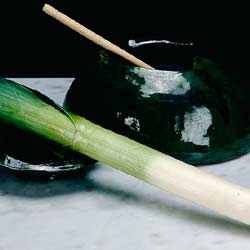| |
|
Alessi cuisine
|
|
| |
Zuppa di erbette degli olivi delle pastorelle
garfagnine
|
- A)
- 400 grams of wild field herbs (radichella, cicerbita, salvastrella,
burdock, watercress, valerianella, rampion, etc.)
- 1 bunch of beet
- 1 bunch of spinach
- salt
- B)
- 2 fresh sausages of pork
- 6-7 spoons of olive oil
- C)
- 2 big red onions, cut in pieces
- 4 garlic cloves
- 1 medium size leek
- 1 spoon of granular stuff for mushrooms broth
- a pinch of dried basil
- a pinch of dried calamint
- a pinch of dried mint
- D)
- 2 eggs
- 50 grams of grated Parmesan cheese
- black pepper
- spices
- table salt
- 8 slices of stale roasted bread
- olive oil
|
 Clean
and wash the herbs keeping them in water for at least 1 hour (rinsing them
more times always changing the water). Wash also the beet and spinach separating
the leaves from the ribs, cut both in pieces, gather them in two different
bowls (leaves in one bowl and ribs in another bowl) always in fresh water.
Take a pot, put 1 litre and ½ of water, salt more than the standard
quantity. Let the water boil, put the herbs and the stalks of beet and spinach.
Cook for 10 minutes, drain, separate vegetables and cooking water and keep
them to use afterwards. In another pot peel the sausages at point B) and
melt them in the oil, brown them for 3-4 minutes over a medium heat and
turning them very often. In the meanwhile take a blender and put inside
all what indicated at point C) together with ½ litre of the above
mentioned vegetables broth, mix very well but do not disintegrate. Pour
this mixture in the pot together with the sausages, increase the heat, turn
ad mix and let the stuff boil, adjusting for a low boiling and let stew
by this way for at least 10 minutes, turning very often and covering with
a lid. At the right time blend also the beet and spinach leaves together
with the remaining vegetables broth, pour it in the pot with the other stuff,
turn and mix very well, increase the heat to re-start the boiling, then
add also the herbs at point A), add some salt if necessary and adjust the
heat for a very slow boiling, let cook for at least other 30 minutes, turning
sometimes and covering with a lid. When the stuff will be ready, beat the
two eggs and add the Parmesan cheese, an abundant pinch of grinded black
pepper and a pinch of spices, always beating with a whisk; roast the bread
and put it in 4 soup plates (two slices each plate), then bathe them with
the beaten and spiced egg. Pour some liquid broth over each slice of bread
in the soup plates in order to reconstitute them and afterwards pour the
remaining broth with the herbs as to cover abundantly the bread. Serve very
hot. Remind to season everything with new oil, spicy and aggressive as to
have stronger and more harmonic tasty sensations. Clean
and wash the herbs keeping them in water for at least 1 hour (rinsing them
more times always changing the water). Wash also the beet and spinach separating
the leaves from the ribs, cut both in pieces, gather them in two different
bowls (leaves in one bowl and ribs in another bowl) always in fresh water.
Take a pot, put 1 litre and ½ of water, salt more than the standard
quantity. Let the water boil, put the herbs and the stalks of beet and spinach.
Cook for 10 minutes, drain, separate vegetables and cooking water and keep
them to use afterwards. In another pot peel the sausages at point B) and
melt them in the oil, brown them for 3-4 minutes over a medium heat and
turning them very often. In the meanwhile take a blender and put inside
all what indicated at point C) together with ½ litre of the above
mentioned vegetables broth, mix very well but do not disintegrate. Pour
this mixture in the pot together with the sausages, increase the heat, turn
ad mix and let the stuff boil, adjusting for a low boiling and let stew
by this way for at least 10 minutes, turning very often and covering with
a lid. At the right time blend also the beet and spinach leaves together
with the remaining vegetables broth, pour it in the pot with the other stuff,
turn and mix very well, increase the heat to re-start the boiling, then
add also the herbs at point A), add some salt if necessary and adjust the
heat for a very slow boiling, let cook for at least other 30 minutes, turning
sometimes and covering with a lid. When the stuff will be ready, beat the
two eggs and add the Parmesan cheese, an abundant pinch of grinded black
pepper and a pinch of spices, always beating with a whisk; roast the bread
and put it in 4 soup plates (two slices each plate), then bathe them with
the beaten and spiced egg. Pour some liquid broth over each slice of bread
in the soup plates in order to reconstitute them and afterwards pour the
remaining broth with the herbs as to cover abundantly the bread. Serve very
hot. Remind to season everything with new oil, spicy and aggressive as to
have stronger and more harmonic tasty sensations. |
|
|
|
|
| |
|
|
|
| |
|
|
|
|